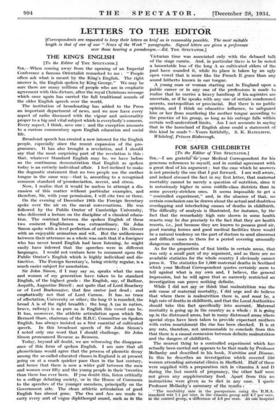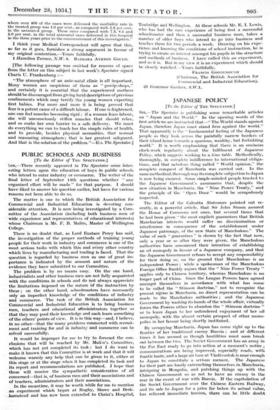FOR SAFER CHILDBIRTH
[To the Editor of THE SPECTATOR.]
SIR,—I am gratefuil your Medical Correspondent for his generous references to myself, and in cordial agreement with a great deal of his argument ; but the case which he answers is not precisely the one that I put forward. I am well aware, and indeed stressed the fact in my first letter, that maternal mortality cannot be merely a. question of nutrition, since it is notoriously higher in some middle-class districts than in some poverty-stricken ones. It seems impossible...to get a " controlled experiment," and, in the absence, of that, no certain conclusion can be drawn about the actual and doubtless overlapping. and interlocking causes of deaths in_ childbirth. The difficulty .of analysis is illustrated, for instance, by the fact that the remarkably: high rate shown in some. health resorts maybe due precisely to Ahe fact that they are health resorts, i.e., just because they are known to ,possess good Air, good nursing homes and good medical facilities there would be a natural tendency on the part of doctors to send abnormal and difficult cases to them for a period covering unusually dangerous confinements.
. As for the proportion of first births in certain areas, that was only a small part of my argument, .and as there are no available statistics for the whole country I obviously cannot press it. The statistics for 1,000 maternal deaths in Scaland which your Medical Correspondent quotes certainly-seem to tell against what is .my own and, I believe, the general impression, but he will agree that so narrowly restricted an investigation can prove nothing definite. While I did not .,say or think that malnutrition was the sole cause of maternal mortality, I did urge, and do: believe that where there is malnutrition there is, and must be, a high rate of deaths in childbirth,-and that the Local Authorities should take this fret specifically into account. Maternal mortality is going up in the country as a whole: it is going up in the, distressed areas, but in many distressed areas where special steps have been taken to provide expectant mothers with extra nourishment the rise has been checked. It is at any rate, therefore, not unreasonable to conclude from this that there is a causal connexion between definite malnutrition and the dangers of childbirth.
The nearest .thing to a controlled experiment which has actually been carried out appears to be that made by Professor Mellanby and described in his boOk, Nutrition and Disease. In this he describei an investigation 'which covered 550 Women attending antenatal clinics in Sheffield Half of these Were supplied with a preparation rich in vitamins A -and D during the last month of pregnancy, the other half were not giVen any suppleinentary food. Apart from this no instructions were given as to diet hi any case. 'I quote Professor Mellariby's summary of the results : " The nerbidiii, rata in the puerperium lifting the B.M.A. 'standard wig 1.1 per-dent.*in the vitamin 'group ancr4.7" percent. is the control group, 'a difference of 3.6 per cent. At one -hospital
where over 400 of the cases were delivered the morbidity rate in the treated group was 1.0 per cent., as compared with 5.8 per cent. in the untreated group. These rates Compared with 7.3, 8.1 and 5.0 per cent. in the total antenatal cases delivered in this hospital in the three years prior to the commencement of this investigation."
I think your Medichl Correspondent will agree that this, so far as it goes, furnishes a strong argument in favour of my original contention.—Yours faithfully,
[The following passage was omitted for reasons of space from the letter on this subject in last week's Spectator signed Charis U. Frankenburg :—
"The atmosphere of an ante-natal clinic is all important. Many women are suspicious of them as " gossip-shops," and. certainly it is essential that the experienced mothers should be discouraged from giving lurid descriptions of previous confinements which may terrify the young women expecting first babies. For more and more it is being proved that fear is a potent cause of a difficult labour. If one is frightened, pne can feel muscles becoming rigid ; if a woman fears labour, she will unconsciously stiffen muscles that should relax, and so make her own barrier to a safe delivery. We must do everything we can to teach her the simple rules of health, and to provide, besides physical necessities, that normal
and reassuring atmosphere; that is her greatest safeguard. And that is the solution of the pret?lem."Eo. The Spectator.]



































 Previous page
Previous page